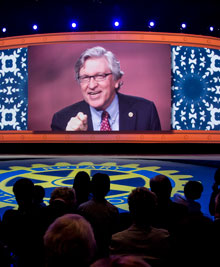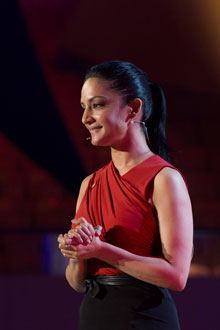Gates Foundation announces new 2:1 match for Rotary Polio Plus until 2018
By Dan Nixon and Arnold R. Grahl Rotary News -- 25 June 2013

Jeff Raikes, chief executive officer of the Bill & Melinda Gates Foundation, addresses Rotarians during the third plenary session Tuesday via a prerecorded video message.

Actress Archie Panjabi explains why she agreed to be a Rotary polio eradication ambassador. Monika Lozinska/Rotary International
“Going forward, the Gates Foundation will match two-to-one, up to US$35 million per year, every dollar Rotary commits to reduce the funding shortfall for polio eradication through 2018,” said Jeff Raikes, the foundation’s chief executive officer, in a prerecorded video address shown during the convention’s plenary session on 25 June. “If fully realized, the value of this new partnership with Rotary is more than $500 million. In this way, your contributions to polio will work twice as hard.”
The joint effort, called End Polio Now – Make History Today, comes during a critical phase for the Global Polio Eradication Initiative . The estimated cost of the initiative’s 2013-18 Polio Eradication and Endgame Strategic Plan is $5.5 billion. Funding commitments , announced at the Global Vaccine Summit in April, total $4 billion. Unless the $1.5 billion funding gap is met, immunization levels in polio-affected countries will decrease. And if polio is allowed to rebound, within a decade, more than 200,000 children worldwide could be paralyzed every year.
Rotary and the Gates Foundation are determined not to let polio make a comeback.
“We will combine the strength of Rotary’s network with our resources, and together with the other partners in the Global Polio Eradication Initiative (GPEI), we will not just end a disease but change the face of public health forever,” said Raikes.
In 2007, the Gates Foundation gave The Rotary Foundation a $100 million challenge grant for polio eradication, and in 2009, increased it to $355 million. Rotary agreed to raise $200 million in matching funds by 30 June 2012, but Rotarians in fact raised $228.7 million toward the challenge.
“Now is the time for us all to take action: Talk to your government leaders, share your polio story with your social networks, and encourage others to join you in supporting this historic effort,” Raikes added. “When Rotarians combine the passion for service along with the power of a global network, you are unstoppable, and the Gates Foundation is proud to partner with you. Let’s make history and End Polio Now.”
Endgame strategy
Bruce Aylward, assistant director-general for Polio, Emergencies and Country Collaboration at the World Health Organization -- a GPEI partner -- said that the finish line for polio eradication is in sight, but cautioned that “it is one thing to see the finish line; it is another to cross it.”
Sharing details of the latest polio eradication strategic plan, he said the plan is historic in finally setting out the endgame, the final steps needed to wipe out polio.
“We now have the plan to complete the program of PolioPlus,” Aylward said. “And we have the backing of you, Rotarians around the world, to get the job done.”
Actress Archie Panjabi, a Rotary polio eradication ambassador, recounted how, as a 10-year-old living in India, she had seen children crawling along the streets, propelled only by their hands. The image troubled her for years. When she was asked to join Rotary’s This Close campaign in 2011, she said she realized that the children she’d seen were polio victims, and that by working to eliminate polio, she could help prevent others from suffering in that way.
“I came to realize that we still have work to do, and how important it is for people like me -- people like you -- to use our voices to raise awareness of, and support for, the global effort to eradicate polio,” Panjabi said. “As a Rotary polio ambassador, I will continue to do whatever I can to spread the word.”
Million dollar donation
John Germ, vice chair of the International PolioPlus Committee, asked Rotarians to reach out to their non-Rotarian colleagues to raise money for polio eradication. He also introduced Sir Emeka Offor, a Nigerian Rotarian, who announced that he is making a new US$1 million contribution to PolioPlus.
During a PolioPlus Advocacy workshop a day earlier, Offor had explained that his contributions to a number of causes are motivated by his humble origins. Now, as a successful businessman, he enjoys giving in order to help others avoid the circumstances he faced.
As a Rotarian, he said he takes pride in Rotary’s good work and in the organization’s leadership in the polio eradication campaign.
“I hope my means will inspire others to join the fight to end polio in Nigeria,” Offor said. “Polio can be eradicated in my country in my lifetime, and it will be.”
Also during the plenary session, Rotary Foundation Trustee Chair Wilfrid Wilkinson reviewed The Rotary Foundation’s accomplishments, all of which were made possible by a 1960s decision by Rotary leaders to use Foundation grants to fund Rotary service.
“Because of the one moment ... because of their ambition, I can look back with all of you at 50 incredible years of achievements through our Foundation -- lives that we have touched, lives that we have saved, lives to which we have brought health, education, and hope,” Wilkinson said. “And we can look ahead, in just a few years now, to a world free of polio.”
Future Vision launch
On 1 July, all Rotary districts will begin using the Rotary Foundation's new grant model, which has been known as Future Vision. Future Vision Committee Chair Luis Giay lead convention attendees in a countdown to the launch of the grant model Tuesday, as the plenary video screens displayed a rocket blasting off into space.
"We are at an unprecedented time in the history of our Rotary Foundation. We are beginning our greatest transformation," Giay said. "Through Future Vision, the Rotary Foundation Trustees have sought to strengthen clubs and districts by providing grants that can help them be more proactive in addressing priority world needs."
"We celebrate our new Foundation, with each of us contributing our effort and commitment to ensure the continued progress of Rotary and all mankind," he continued.
Jorge Aufranc, past governor of District 4250, also shared how the new grant model has helped his district make a big impact in helping promote literacy and economic development in local communities. He said the district feared it would lose its connections when the Future Vision pilot began. But in reality, what could have been a challenge turned into an opportunity to do even more good.
Aufranc introduced Mirna Pérez, the principal at Próximos Pasos, one of the schools helped by a District 4250 global grant. Pérez shared how a mechanical cow has helped students receive proper nutrition, and be more alert for their studies. It has also given them an incentive to come to school. The device turns soy beans into milk and a pulp called okara, and twice a week community members come to the school to bake cakes and tortillas.
"Now the girls are becoming confident women who can succeed through education and become a generation that can go much further than their ancestors," Pérez said.
Download the website sponsorship guide


